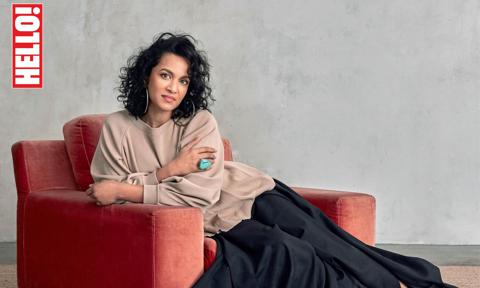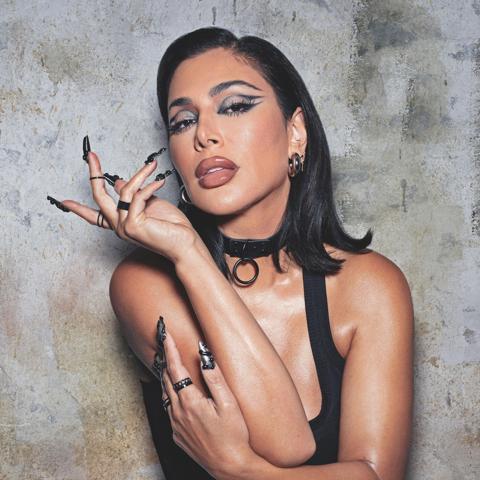
The acclaimed musician, currently immersed in the creation of a new album, delves into expressing emotions through her music, navigating the blessings and pressures of her late father’s shadow, and the enduring appeal of classical music for future generations in a tête-à-tête with HELLO!
Anoushka Shankar, the daughter of sitar virtuoso and composer Pandit Ravi Shankar, is today a prodigy unlike any other. Her music, sitar performances and compositions transcend nationalities, something the 42-year-old seems to do herself. Having grown up all over the world, the renowned musician — with nine Grammy nominations under her belt — does manage to stay in touch with many of her relatives in India, but when it comes to an identity, it’s safe to say she’s a world citizen.
Speaking to HELLO! during her short trip to India, she offered us an intimate glimpse into her music creation process, discussed the challenges of living up to her father’s legacy, and shared her plans for the near future.
In Conversation With Anoushka Shankar

HELLO!: Anoushka, welcome back to India! What’s on the agenda for you while you’re here and what’s in store ahead?
Anoushka Shankar: “I’m in Mumbai for a few days of work and looking forward to playing music from my new album Chapter I: Forever, For Now. Then it’s back to the grind with the main focus on touring globally and releasing the ongoing chapters of music.”
H!: Do you enjoy returning to India, does it feel like a bit of a homecoming for you?
AS: “Yeah, very much so. It’s always wonderful to come back. Some cities bring me more joy, while others offer a different experience. I have family in India. Though I’m closer to my mum’s family in the South, there are some members of my dad’s family in the country as well, though many of them have settled in the States over the years.”
H!: Tell us a bit about Forever, For Now? How did the idea of a trilogy of ‘mini albums’ come up and what’s the theme behind it?
AS: “So leading into Forever, For Now, I wanted to work with [Grammy Award-winning Pakistani artist] Arooj Aftab, who’s a good friend of mine. I had worked on her album and that had gone really well. Then, we started talking about producing something together, and I realised that I wanted to work on smaller, more contained projects. Chapter One happened with Arooj and with my other dear friend [German musician and composer] Nils Frahm. We’d worked together in Berlin in January last year and that set the template for Chapters Two and Three. I’ve worked with different people from different cities, trying to work and capture moments in time, work in different mediums, and create wholly different musical experiences every time.”
H!: Do you always aspire to move audiences with your music?
AS: “I mean, I’m not making music in a vacuum. I want it to have the ability to reach people; I have to be very honest and connected, and put myself into it. But not all music has to be deeply moving or life changing. Layers are necessary; sometimes, music can be groovy and fun.”

H!: Your 2016 track “Crossing The Rubicon” was profoundly moving for many. It becomes evident that it’s a spiritual piece of work after listening to it. Did you intend to convey that spiritual element while creating it?
AS: “Thank you; first of all, I’m glad you had that response to that music. It’s hard to talk about process in that way; sometimes, what I put in is not what someone else receives. There’s something intangible about how we make art, and how it is received once we hand it over. I’ve grown more and more trusting of being emotional and vulnerable within my music. It’s a space where others can project their own feelings. There’s a certain ambiguity in instrumental music; listeners can experience a distinct emotional connection when they engage with it.
‘Crossing The Rubicon’ was crafted through a highly conceptual process, forming part of my album Land of Gold, where the songs revolved around the refugee crisis. The intention was to imagine various facets of a refugee’s journey in order to help listeners relate to it. ‘Crossing The Rubicon’ was the emotional dark point of the album, signifying the inner strength, turmoil, the journey for survival. How people hear that is different. That song has a very intense journey.”
H!: You’ve collaborated with several industry legends. Who’s been your favourite and are you collaborating with any Indian artists in the future as well?
AS: “I can’t choose one. I have been very, very fortunate to collaborate with a vast array of individuals — generations above me, peers, and currently, I am working with younger people, spanning diverse cultures and musical forms. It’s one of my favourite things — connecting with potentially strangers, individuals who share my passion for music. Across these chapters, Chapter Three is quite rooted in an Indian base. My collaboration may not have been in a mainstream kind of way, but it’s been a significant one to me. We can talk more about it when I get to the point of releasing it.”
H!: Do you feel pressured to live under the shadow of being your father’s daughter?
AS: “I’ve been doing it my whole life, so there’s been a lot of practice. It was different when I was younger, newer to this career. I think the quality of it has changed completely now. I still believe it depends on perspective. It’s a pressure and shadow, but also a blessing and a learning experience at the same time. It was also what gave me my musical goals, made me want to make music. He was a central part of it and that removes that intimidating, shadow aspect. Basically, I ignore it. It was going to be there whether I liked it or not.”

H!: The music scene today is vastly different from what it was during your father’s time. Do you sense that the disconnection many young Indians have with classical music is only increasing?
AS: “I am not that old myself; I may not be a teenager, but I’m not 60 either. I’ve been doing this for 25 years now and I can tell you that I was getting this question when I was 13. In response I have to say, no. People have always been worried that younger people are not connecting to their roots anymore. I think there’s something about that question; I think we can all just trust that culture does get passed on. It’s a generational process, and that’s okay. I don’t feel the youth are disconnected; it’s normal to be young and find your own voice, step away from parents, but I think we can trust that it does not mean a loss of culture or identity.”
H!: What are you consuming these days in terms of music and literature?
AS: “I think a lot of incredible novels came out recently. I read Tomorrow, and Tomorrow, and Tomorrow by Gabrielle Zevin which was really good actually. There’s been some good spoken word poetry in London, which is seeing a great resurgence in that art. There’s been some great music and literature on the scene this year. I love to take it all in, it’s hugely inspiring.”
Interview: Vishwaveer Singh; Photos: Laura Lewis
This interview has been adapted for the web from our February 2024 issue. Grab your copy here.






